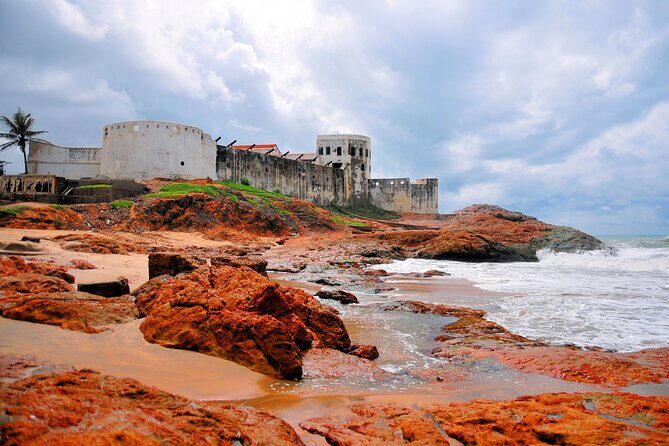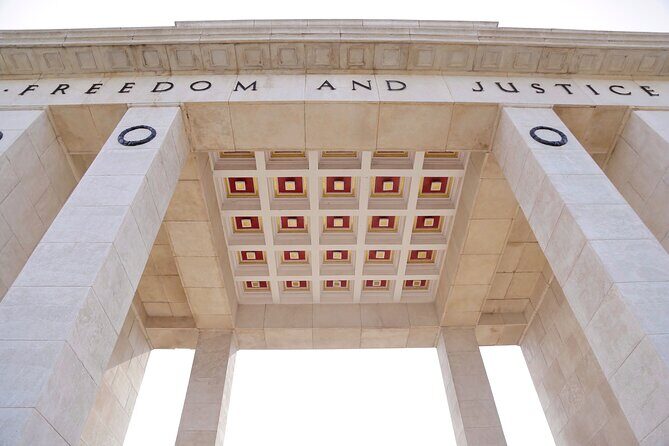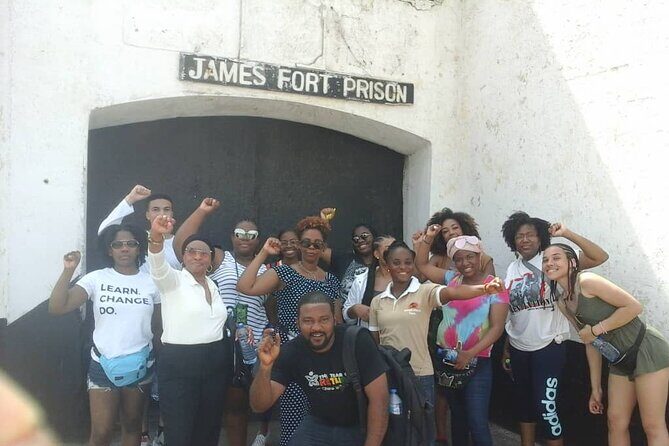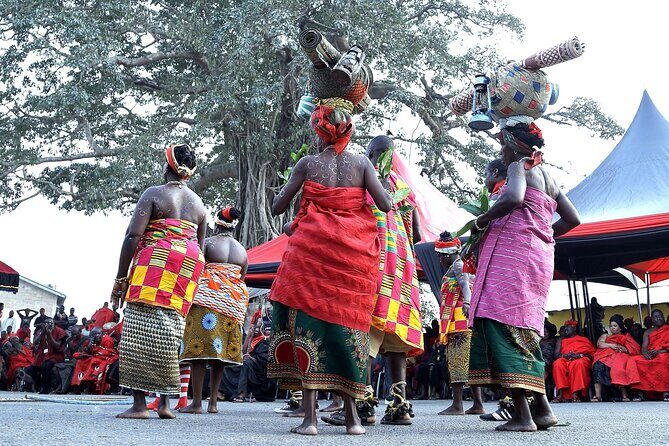If you’re considering a trip to Ghana that goes beyond just sightseeing, this 8-day Ghana Heritage Tours – Beyond The Return offers a comprehensive dive into the country’s culture, history, and traditions. Our review is based on actual feedback from travelers who have experienced this journey firsthand, and it’s clear that this tour delivers an authentic, well-organized, and emotionally enriching experience.
What we love about this tour? First, the expert guidance and local insight from knowledgeable guides, making each site come alive. Second, the thoughtful itinerary that balances historical landmarks with cultural activities, such as bead-making and traditional ceremonies. Lastly, the overall value—with accommodations, meals, and transfers included, it feels like a well-rounded package for those genuinely wanting to connect with Ghanaian roots.
One aspect to keep in mind: the tour covers a lot of ground, which means early mornings and busy days. If you prefer a more relaxed pace or are traveling with very young children, some adjustments might be necessary.
This tour suits travelers who are passionate about history, culture, and meaningful experiences—those ready for an emotional, eye-opening journey into the essence of Ghana.
- Key Points
- What You Can Expect from This Tour
- Transportation and Comfort
- Daily Flow and Pacing
- Cost Versus Value
- Detailed Breakdown of the Itinerary
- Day 1: Arrival in Accra
- Day 2: Exploring Accra’s Heritage
- Day 3: Deep Dive into Cultural Roots
- Day 4: Kumasi and Ashanti Heritage
- Day 5: Cultural Traditions and Weaving
- Day 6: Connecting with Ancestors
- Day 7: Nature and a Personal Ceremony
- Day 8: Farewell and Reflection
- Final Thoughts: Who Is This Tour For?
- FAQ
- More Guided Tours in Accra
- More Tours in Accra
- More Tour Reviews in Accra
- Still browsing? Here are more Accra experiences we've covered recently
Key Points

- All-Inclusive Experience: Accommodation, meals, transfers, and excursions are included, offering great value.
- Deep Cultural Engagement: From traditional naming ceremonies to local markets, the tour provides genuine insight into Ghanaian life.
- Expert Guides: Knowledgeable local guides enhance every site visit with personal stories and context.
- Historic and Emotional Sites: From Cape Coast Castle to Assin Manso Slave River, the itinerary is packed with powerful landmarks.
- Authentic Interactions: Opportunities to meet seamstresses, bead makers, and community elders make the experience personal.
- Flexible Yet Structured: The 8-day itinerary balances guided tours with free time for reflection or nightlife.
What You Can Expect from This Tour

This 8-day journey is designed to take you through Ghana’s layered history and vibrant culture. The blend of structured visits and opportunities for personal discovery makes it suitable for travelers who want both a curated experience and moments of authentic connection.
Fascinated by the past? Here are other historical experiences we've covered in Accra
Transportation and Comfort
Transport is via air-conditioned vehicle, which adds a layer of comfort after long days of sightseeing. The group size appears to be private, meaning you’ll have dedicated attention from your guide, Alex, whose reviews suggest he’s both knowledgeable and personable—“Everyone was attentive to our needs and made us feel welcome,” shares Carol_M.
Daily Flow and Pacing
The tour tends to start around midday, giving you mornings free to relax or explore on your own. Each day is packed with visits, often lasting 1-2 hours per site, which is manageable without feeling rushed. Evenings are left open for optional nightlife, especially in Accra and Kumasi, allowing you to unwind or mingle.
Cost Versus Value
At $3,595 per person, this may seem steep initially—but when you consider that it includes all accommodations, most meals, all excursions, transfers, and a traditional naming ceremony, the value is compelling. Travelers have praised the extensive itinerary, the quality of guides, and the emotional depth of the experiences, which makes the cost worthwhile.
Detailed Breakdown of the Itinerary
Day 1: Arrival in Accra
Your Ghanaian adventure begins with a warm Akwaaba greeting at the airport. The team will be ready to meet you with a sign, which is a nice touch after a long flight. The transfer to your hotel sets the tone for comfort, and your first dinner provides a chance to meet fellow travelers and discuss the upcoming days.
Day 2: Exploring Accra’s Heritage
Starting at the National Museum of Ghana, you’ll get a broad overview of West African culture with exhibits from Ghana and neighboring countries. Reviewers love this spot for its ethnographic displays and sculptures that highlight traditions—”an excellent overview of West African culture” is a phrase that sums it up nicely.
Next, the Kwame Nkrumah Memorial Park offers a poignant view of Ghana’s independence movement. Visitors often mention the well-maintained gardens and insightful museum, which tell the story of Ghana’s pioneering leader.
The vibrant James Town neighborhood rounds out the day, with its colorful fishing boats, colonial structures, and the historic lighthouse. The walking tour here is lively, giving a real feel for life in this historic port district.
Evening options in Accra are plentiful, and the tour’s flexibility allows you to explore the nightlife or relax at your hotel, which many find appealing after a busy day.
Day 3: Deep Dive into Cultural Roots
The W.E.B. DuBois Center gives visitors a chance to connect with Pan-Africanism through DuBois’s former home and library—“a touching homage to a man who fought for Black rights,” according to reviews.
A visit to TK Beads offers an interactive experience of traditional bead-making, which is highly regarded for its symbolism of wealth and beauty. Many travelers purchase beads here, appreciating their craftsmanship and cultural significance.
The afternoon takes you to the Aburi Botanical Gardens, with stunning views and exotic flora. From reviews, we learn that guides explain medicinal plants’ uses, adding depth to the walk.
The Aburi Crafts Village showcases talented artisans creating drums and sculptures, with prices lower than in the city—ideal for souvenir shopping.
Day 4: Kumasi and Ashanti Heritage
The Manhyia Palace Museum offers a fascinating look at the Ashanti empire, with many noting the opportunity to learn about Nana Yaa Asantewaa—a legendary warrior queen. This site is central in understanding the resilience of Ashanti culture.
The Prempeh II Museum continues the history lesson with artifacts dating back centuries, giving visitors a richer understanding of the region’s past.
Kejetia Market is a bustling hub for daily life and shopping. Reviewers find it a sensory overload—”a labyrinth of stalls”—but well worth the visit for its authenticity.
The Okomfo Anokye Sword symbolizes unity and strength, and many appreciate the legend surrounding the sword, with some noting how Muhammad Ali tried to pull it out during his visit.
Evening entertainment options in Kumasi provide a lively end to the day, with some travelers choosing to relax and others opting for the city’s vibrant nightlife.
Day 5: Cultural Traditions and Weaving
The morning at the Asante Traditional Buildings, UNESCO-listed sites, reveals the architecture and history of Ashanti leadership—highlighting figures like Nana Yaa Asantewaa.
Adanwomase is a highlight for those interested in textiles. Watching skilled weavers craft Kente cloth and learning about its symbolism offers a tangible connection to Ghanaian artistry.
Ntonso introduces you to Adinkra symbols—each with deep meanings—allowing you to create your own strip of fabric, a memorable souvenir that also carries personal significance.
The day ends with free time in Kumasi, allowing you to reflect or enjoy the local scene.
Day 6: Connecting with Ancestors
This poignant day begins with a visit to Assin Manso, the site of the Slave River—an emotional moment for many. The stories of ancestors marched through here are powerful, and reviews emphasize its importance in understanding the transatlantic slave trade.
Later, the Cape Coast Castle offers a visceral experience of the slave trade’s brutality, with detailed tours of the dungeons and the infamous “Door of No Return.” Reviewers describe it as “a harrowing but necessary” visit.
Afterward, you’ll relax at a beachfront hotel, with reflection time and ocean views that make for a peaceful end to an intense day.
Day 7: Nature and a Personal Ceremony
Kakum National Park provides a breath-taking experience on its canopy walkway, with views across the rainforest. Travelers highlight the thrill of walking 40 meters above the forest floor, with many mentioning the stunning vistas and the lush surroundings.
The highlight of the day is the Traditional Naming Ceremony in a local village. The pouring of libation, drumming, dancing, and the official naming by chiefs create a deeply personal moment—many reviewers find it moving and empowering.
In the evening, the celebration continues with local nightlife, giving you a taste of Ghanaian festivities. Some travelers wear outfits made earlier in the trip, making the moment even more special.
Day 8: Farewell and Reflection
On your way back to Accra, a visit to Elmina Castle provides one last glimpse into the colonial and slave trade history. The castle’s museum details local history, and the walk through the fishing town offers a relaxed end to your tour.
A final group dinner in Accra is a chance to share reflections and say goodbye to new friends before heading home or onward.
Final Thoughts: Who Is This Tour For?

This 8-day Ghana Heritage tour is best suited for travelers eager to experience Ghana beyond the typical tourist spots. It’s ideal for those who want a deep cultural connection, with opportunities for personal engagement, guided storytelling, and participation in traditional ceremonies.
The inclusion of historical sites, local markets, craft villages, and a powerful slave trade memorial makes it especially suitable for history buffs and those interested in African heritage. The tour’s structure ensures you’ll get a rundown, but the pace might be intense for travelers seeking a slow, leisurely vacation.
If you’re looking for a thought-provoking journey that balances education, culture, and emotional moments, this tour offers incredible value and authenticity. It’s crafted for those ready to walk in their ancestors’ footsteps and leave with more than just souvenirs—an understanding of Ghana’s soul.
FAQ

Is pickup offered from the airport?
Yes, airport transfers are included as part of the tour, making arrival and departure smooth and hassle-free.
What is included in the price?
The $3,595 fee covers accommodations, meals, transfers, all excursions, a traditional naming ceremony, guides, and insurance.
Are meals provided?
Yes, breakfast, lunch, and dinner are included for the duration of the tour.
Can I participate if I have limited mobility?
Most activities involve walking and site visits, so it’s best for travelers who are comfortable with some walking and uneven surfaces.
What’s the best time to book?
Most travelers book approximately 99 days in advance. The tour runs year-round, but consider local weather and festival schedules for ideal timing.
Is this a group tour or private?
It is a private experience, so only your group will participate, allowing for a more personalized journey.
Are there opportunities for shopping?
Absolutely. Markets like Kejetia and arts villages offer authentic crafts, fabrics, and souvenirs at reasonable prices.
What if I want to extend my stay?
While not included, extensions can often be arranged through the tour provider or local operators.
How emotionally intense are the memorial visits?
Sites like Assin Manso and Cape Coast Castle are deeply moving, providing powerful insights into the history of slavery—many find them profoundly affecting.
In essence, this tour offers a carefully curated route into Ghana’s culture and history, delivered with expert guides and meaningful interactions. It’s a chance to not only see Ghana but to feel its heartbeat through stories, sites, and traditions that will stay with you long after you leave.
More Guided Tours in Accra
More Tours in Accra
More Tour Reviews in Accra
Still browsing? Here are more Accra experiences we've covered recently
- Explore Aburi Botanical Gardens And Boti Falls
- Accra to Aqua Safari Resort Eco-Friendly Tour with Meal
- African Naming Ceremony
- Accra: Cocoa Farm & Waterfalls Tour
- ACCRA GUIDED CITY TOUR, GHANA
- Accra Slave Tour
- Traditional Beadmaking Workshop
- 10 Days Heritage, History and Adventure Tour in Ghana
- Accra: Whirlwind Guided City Tour by Car with Entry Fees
- Accra: Guided 10-Day Panafest Festival 2025 Tour
- From Accra: The Cape Coast Day Tour Guided Experience
- Ghana: 3 Days Sightseeing
